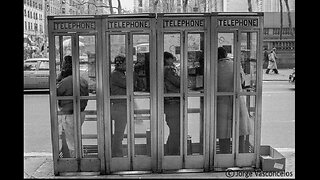Premium Only Content

Social cohesion in Australia, UK & USA (1-6-22)
Broken societies: Inequality, cohesion and the middle-class dream: https://lukeford.net/blog/?p=142699
‘There is no evidence that the ethos of a people can be changed according to plan. It is one thing to engineer consent by the techniques of mass manipulation; to change a people’s fundamental view of the world is quite a different thing, perhaps especially if the change is in the direction of a more complicated and demanding morality’. (Edward Banfield in 1958)
Christian Larsen writes in 2013: The intriguing finding is that the share of ‘trusters’ has decreased dramatically in the US and UK. In 1959, 56 per cent of British respondents said that most people can be trusted; in the latest World Value Survey, this figure was down to 30 per cent. In 1960, 55 percent of Americans said that most people can be trusted; now it is 35 per cent. In Denmark and Sweden, by contrast, the share of ‘trusters’ has increased.
What Is Social Cohesion? https://lukeford.net/blog/?p=142679
* I suggest that we define social cohesion as the belief held by citizens of a given nation-state that they share a moral community, which enables them to trust each other… The very discussion of social cohesion often implies its absence and, even more specifically, the decline of social cohesion. I suggest that we label the decline of social cohesion “social erosion”, which we then can define as fewer citizens in a given nation-state having the belief that they share a moral community that enable them to trust each other…
* In a modern globalized and multicultural world, it is difficult and problematic to cultivate a similarity of mind.
National identity & social cohesion: https://lukeford.net/blog/?p=142671 * [Hans] Kohn’s distinction had its roots in Meineke’s (1970[1907]) distinction between “staatsnation” (state nation) and “kulturnation” (culture nation). Kohn’s basic argument was that in Western Europe (his examples were France, the UK, The Netherlands and Switzerland), the borders of the state were settled prior to the rise of nationalism, which created a strong focus on the new democratic procedures that could legitimize the existing state. Nationalism therefore contained a narrative about turning oppressed inhabitants into citizens. In a less positive interpretation, Tilly calls it a “state-led nationalism” where “rulers who spoke in a nation’s name successfully demanded that citizens identify themselves with that nation and subordinate other interests to those of the state” (Tilly 1994:133). In contrast, the borders in Eastern Europe were settled after the rise of nationalism, which created a strong focus on the ethnic/cultural dimension of nationhood. Tilly calls it “state-seeking nationalism” where “representative of some population that currently did not have collective control of a state claimed an autonomous political status, or even a separate state, on the ground that the population had a distinct, coherent cultural identity”...
-
 3:55:26
3:55:26
Luke Ford
5 days agoTrump Proposes Cleaning Out Gaza (1-26-25)
1733 -
 LIVE
LIVE
Nerdrotic
3 hours ago $7.74 earnedCap 4 and Emelia Perez BACKLASH! Acolyte is Still CANCELED! Hollywood STFU | Friday Night Tights 339
6,552 watching -
 LIVE
LIVE
The Jimmy Dore Show
3 hours agoTulsi SHREDS Intel Agencies in Senate Hearing! Jon Stewart’s Anti-China Propaganda! w/Elaine Culotti
18,518 watching -

Afshin Rattansi's Going Underground
1 day agoMax Blumenthal on US’ Ukraine Aid Corruption, 'Psychotic' Israel Turning the West Bank into Gaza
1.18K -
 LIVE
LIVE
Sarah Westall
1 hour agoUnited States in a Two Front War, Identify Military Psyops and Special Operations w/ Jeffrey Prather
122 watching -
 LIVE
LIVE
Quite Frankly
5 hours ago"Open Phones: D.C. Crash, Senate Hearings, Petty Break-Ups" 1/31/25
245 watching -
 LIVE
LIVE
2 MIKES LIVE
4 hours ago2 MIKES LIVE #173 Open Mike Friday!
175 watching -
 LIVE
LIVE
LFA TV
7 hours agoDemocrats’ Greatest Fear Is Accountability | TRUMPET DAILY 1.31.25 7pm
100 watching -
 23:15
23:15
Bare Knuckle Fighting Championship
1 day agoBKFC FIGHT NIGHT MOHEGAN SUN FREE FIGHTS
6.88K1 -
 5:49:46
5:49:46
Bitfinex
7 hours agoBitfinex Talks Live at PlanB El Salvador - Day 2
11.7K1